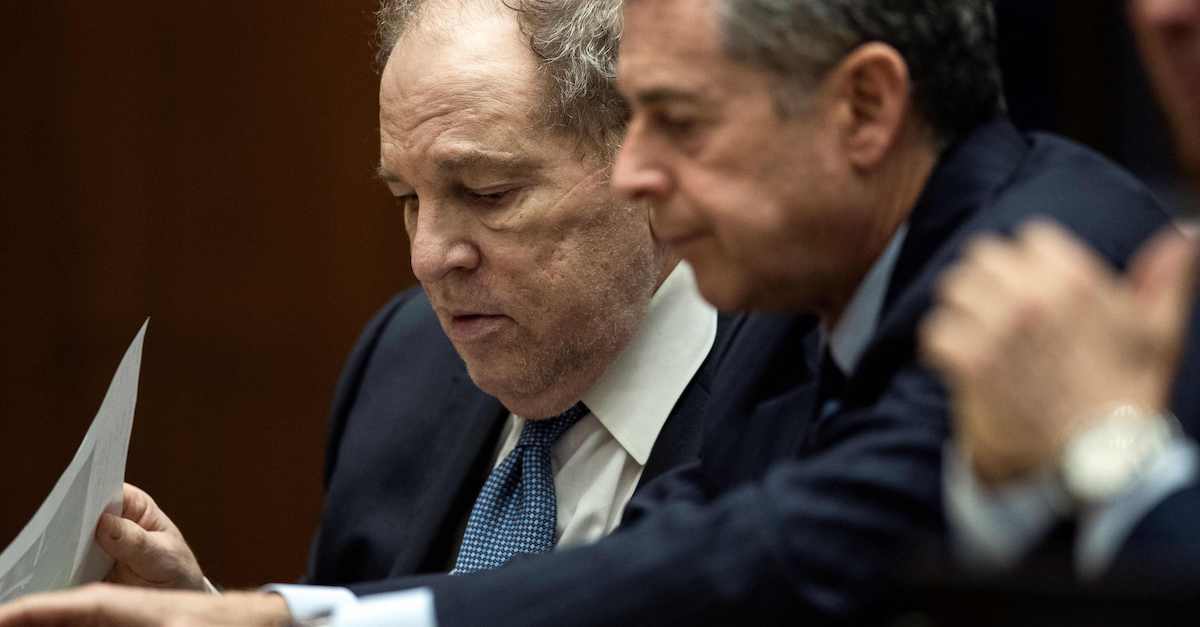
Former film producer Harvey Weinstein interacts with his attorney Mark Werksman in court at the Clara Shortridge Foltz Criminal Justice Center in Los Angeles, California, on Oct. 4, 2022.
Deliberations in fallen Hollywood producer Harvey Weinstein’s West Coast trial will stretch into another week, as jurors appear to be seeking guidance by inspecting the evidence through notes withheld from public view.
The court will be in recess on Thursday and Friday, but jurors will return Monday for its ninth full day of deliberations, which have already run longer than the New York trial that led to Weinstein’s convictions.
Los Angeles County Superior Court Judge Lisa B. Lench has been addressing questions from the jury over the phone in closed court, an unusual approach that drew outcry from journalists who learned about it after sitting in front of her courtroom all day for days, awaiting any hint of action.
According to minute orders released this week by the Los Angeles County Superior Court communications office, jurors asked their first question on Dec. 6, which was the second full day of deliberations after the jury deliberated for about 2.5 hours on Dec. 2.
Lench will not allow the public to know what the question says, issuing an order on Wednesday that said she believes doing so would interfere with ongoing deliberations. She also declined to release the contents of another question the jury sent on Dec. 9.
“The fact that these communications were received from the jury, and the fact that the court responded to them are contained in the court’s minutes. In accordance with California Rules of Court, Rule 2.1030(A), all communications between the jury and the court have been preserved for inclusion in the record,” according to the minute order. “All communications have been disclosed to and discussed with counsel in accordance with the penal code. The contents of the communications reveal the deliberative process of the currently-deliberating jury. As such, the curt believes it would be inappropriate to release to the press the contents of the communications prior to the discharge of the jury as it would impinge on the deliberative processes of the jury.”
The minute orders show the first question on Dec. 6 was a request to hear the court reporter read aloud a testimony transcript. The jury notified the court of the request at 11:53 a.m. on Dec. 6, which Lench discussed with prosecutors and Weinstein’s lawyers over email, according to the first order.
The jury left at 3:30 p.m. that day, then returned the next day and began listening to the testimony read back at 9:37 a.m. It ended at 10:43 a.m. The jury notified the court of another question on Dec. 9 at 1:46 p.m.
“The court and counsel confer via email; a written response is returned to the jury at 3:46 p.m.,” according to the minute order. The jury left 10 minutes later.
Earlier in the day, Lench had allowed reporters into her courtroom for what was believed to be the first interaction between the court and the attorneys since the jury began deliberating: A discussion about whether an alternate juror with travel plans for the next could be dismissed. Lench declined to dismiss the alternate after Weinstein’s lawyer Mark Werksman said, “We have a strong preference that he not be dismissed.”
In this trial, alternates are required to be at the courthouse each day while the regular jury deliberates.
The jury is to listen to the court reporter read aloud more testimony when they return on Monday. It’s unclear what their schedule plans are for next week, with Christmas on Sunday, Dec. 25. The jury has as of the end of Wednesday deliberated for 37 hours over 8 ½ days.
Weinstein is charged with seven crimes:
– forced oral copulation, forcible rape and penetration with a foreign object involving Jane Doe 1, an Italian actress who testified that Weinstein raped her at Mr. C’s hotel in Beverly Hills when she was in Los Angeles for the L.A. Italia Film Festival in February 2013.
– sexual battery by restraint involving Jane Doe 2, who testified Weinstein groped her breast while masturbating in front of her at the Montage hotel in Beverly Hills, also in February 2013
– sexual battery by restraint involving Jane Doe 3, a Hollywood masseuse who spoke with with ABC News’ 20/20 using her full name Juls Bindi about Weinstein groping her while masturbating in 2010
– forced oral copulation and forcible rape involving Jane Doe 4, who is Jennifer Siebel Newsom, wife of California Gov. Gavin Newsom.
Weinstein already is serving 23 years in New York state prison after a jury convicted him of first-degree sexual assault and third-degree rape in February 2020. The jury deliberated five days before reaching the verdict, which included three acquittals.
New York’s highest court agreed in August to hear Weinstein’s appeal.
Four other women were witnesses under California Evidence Code section 1108, which allows testimony about a defendant’s “past sexual misconduct, alleged and otherwise, when they are currently on trial for a sex crime.”
Read all Law&Crime’s coverage of Weinstein’s trial here.
(Image: Photo by ETIENNE LAURENT/POOL/AFP via Getty Images)